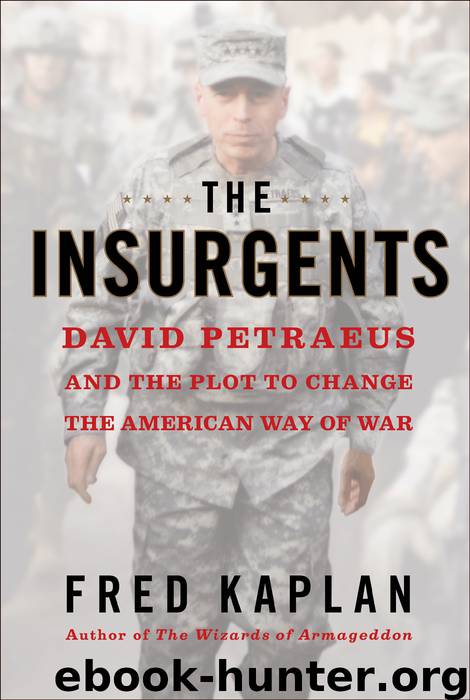The Insurgents by Fred Kaplan

Author:Fred Kaplan
Language: eng
Format: epub
Publisher: Simon & Schuster
16.
The Surge
In mid-September David Petraeus received a phone call from General Peter Pace, chairman of the Joint Chiefs of Staff. A consensus was forming among senior officers in the Pentagon that a spurt of new thinking might help turn the war around. Pace was putting together a group of creative colonels to advise the generals on their options, and he wanted Petraeus’s input on which colonels should be called.
Petraeus needed only a few seconds to respond. Here was a rare chance, still a few months before the COIN manual’s publication, to install followers of the cause into the Pentagon’s inner sanctum. He doubted that Pace would take anyone off the battlefield for this project, but there were two colonels—both acolytes of sorts to Petraeus and, in his eyes, brilliant—who now had some time on their hands.
One was Pete Mansoor, a West Point graduate with a concentration in history, the top-ranking cadet in the class of 1982. The other choice—an obvious one—was H. R. McMaster, the 3rd Armored Cavalry commander who had made counterinsurgency work in Tal Afar.
Mansoor could head off to Washington right away with Petraeus’s blessings. But McMaster had just moved with his family to London to take a yearlong Army fellowship at the International Institute for Strategic Studies, doing research and writing on the future of US military policy in the Persian Gulf and South Asia. It was only his second day on the job when he got the call from one of General Pace’s aides, asking him to come work at once on a top-secret project for the chairman.
McMaster wasn’t sure what to do; the aide who called him couldn’t discuss any details about the project on the phone. So McMaster called General John Abizaid, the head of US Central Command, who’d arranged for him to get the London fellowship. Abizaid had heard a little about the project. He told McMaster that it concerned the war in Iraq but that he should feel no obligation to take it; he could stay in London and do his long-term research if he preferred.
Two days later, McMaster left for Washington.
When he checked in at the Pentagon, he was taken to “the Tank,” the Joint Chiefs’ conference room on the building’s second floor, where he found himself joined by fifteen other colonels from all the services. They were told that their work, even the very existence of the group (which came to be called the “council of colonels”), must be kept secret. Their mission was to give the chiefs unvarnished advice about the war in Iraq. They were to examine all scenarios and options—political, strategic, tactical, operational—and would be allowed access to everything they wanted, from the daily intelligence briefings to the most highly classified data on weapons systems. Once a week, sometimes twice, they would meet with the chiefs, not just to brief them on the work but to discuss it, without regard to the formalities of rank, as if they were peers.
McMaster had never heard of a setup like this, couldn’t have conceived of such a thing.
Download
This site does not store any files on its server. We only index and link to content provided by other sites. Please contact the content providers to delete copyright contents if any and email us, we'll remove relevant links or contents immediately.
The Radium Girls by Kate Moore(10933)
The Templars by Dan Jones(4201)
100 Deadly Skills by Clint Emerson(4095)
Rise and Kill First by Ronen Bergman(4029)
The Doomsday Machine by Daniel Ellsberg(3743)
The Rape of Nanking by Iris Chang(3535)
Killing England by Bill O'Reilly(3469)
Hitler in Los Angeles by Steven J. Ross(3455)
Stalin by Stephen Kotkin(3099)
12 Strong by Doug Stanton(3065)
Hitler's Monsters by Eric Kurlander(2741)
Darkest Hour by Anthony McCarten(2655)
Blood and Sand by Alex Von Tunzelmann(2617)
The Art of War Visualized by Jessica Hagy(2427)
Hitler's Flying Saucers: A Guide to German Flying Discs of the Second World War by Stevens Henry(2306)
The Code Book by Simon Singh(2223)
The Second World Wars by Victor Davis Hanson(2140)
Babylon's Ark by Lawrence Anthony(2079)
Tobruk by Peter Fitzsimons(2070)
